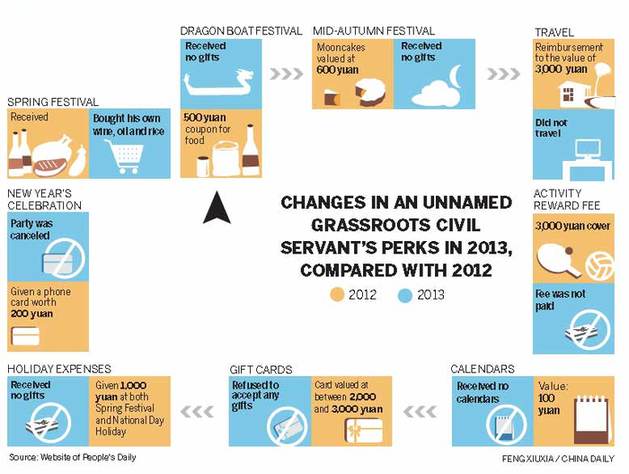
According to Parkinson of RMG, an increasing number of people are becoming frustrated with the slow pace of work, the relatively low wages and the dull existence of civil service workers.
"As more and more young Chinese are exposed to the outside world and their families' views become less important to them, or rather they become increasingly confident challenging those views, they become aware that there are far more lucrative and interesting positions in commerce and industry - sectors with a high demand for well-educated, intelligent and, most important, 'thinking' graduates," he said.
Dai noticed that the tide had turned when people expressed a willingness to trade a public-service desk job for the vitality of the private sector. For example, the dominant topic on his old university's online chat room has changed from "Civil servant exam preparation" to "Ten tips on how to quit a public post".
According to a survey conducted by Henan Business Daily in February, more than 60 percent of civil servants in Henan provincial government departments and public institutions have considered quitting their jobs.
Lack of candidates
In Zhejiang, the country's most affluent province, about 230,000 people signed up for the entry exam to become provincial civil servants this year, a decline of 25 percent from 2013, according to official data.
Wu Song, the mayor of Baoshan, a city in Yunnan province, expects the number of aspiring civil servants to decline in the coming years.
"Traditionally, the Chinese believe that a good scholar is the perfect person to become an official. But things have changed. I think college graduates will have a wider range of career options, such as business, agriculture or science, rather than simply becoming civil servants," he said.
The central government's reduction of administrative power and its endorsement of market economics have also provided young people with an incentive for change.
Premier Li Keqiang has repeatedly encouraged college graduates to start their own businesses and has promised a package of policies to support young entrepreneurs.
Li Kai, who will graduate from East China Normal University this year, regards becoming a civil servant as a "job option" rather than a "dream offer". After spending time as an intern at a local government agency, Li realized he was more interested in the business and corporate world. He has received five job offers from multinational corporations. His classmates have all taken the civil service entry exam.
"The 'civil servant heat' is fueled by the perceived social status, strong job security and employee benefits. But people should ask themselves whether the job fits their personality and plays to their strengths," he said.
Simon Lance, China regional director of the recruitment agency Hays, has also noticed a movement to the private sector from China's civil service.
"The reasons most regularly cited by candidates who wish to pursue careers in the private sector are related to management style, career progression and professional development," Lance said, adding that many private businesses are investing heavily in training and development programs.
But gaining a well-paid job is not as easy as one might imagine. Dai said he lacks the skills employers are seeking, especially for positions with competitive salaries. "They are either seeking people with certificates in public accounts and financial analysis, or those who have passed the national judicial examination. I have none of those skills. I'm only good at administrative work," he said.
Lyu Chenyan, who recently resigned from the Shanghai Municipal Bureau of Local Taxation after seven years, said she could not stand the "bureaucracy and hierarchy". Except for a small number of positions dealing with government affairs, she said her competitive edge is near zero compared with new graduates. Instead, she has selected to study international development at Columbia University in New York.
"During those seven years, I eventually realized that I was not suited to the humdrum, predictable life of the civil service, but if I were to switch jobs right now, I would feel inferior to my peers," she said.
Shi Jing and Hu Yongqi contributed to this story.
